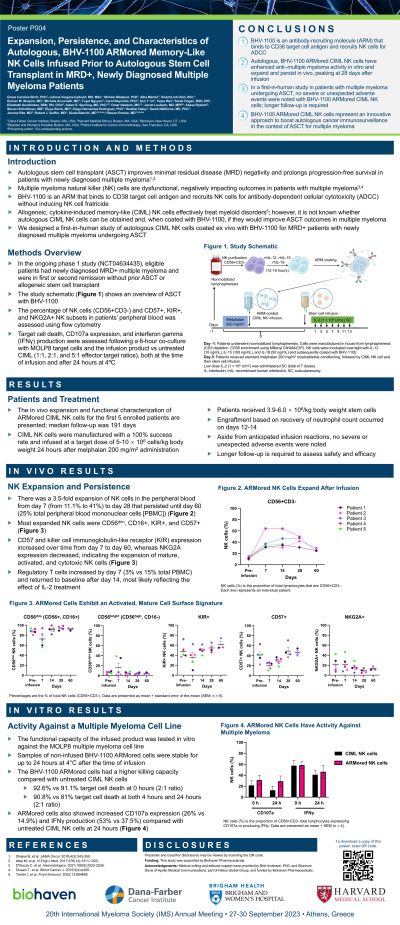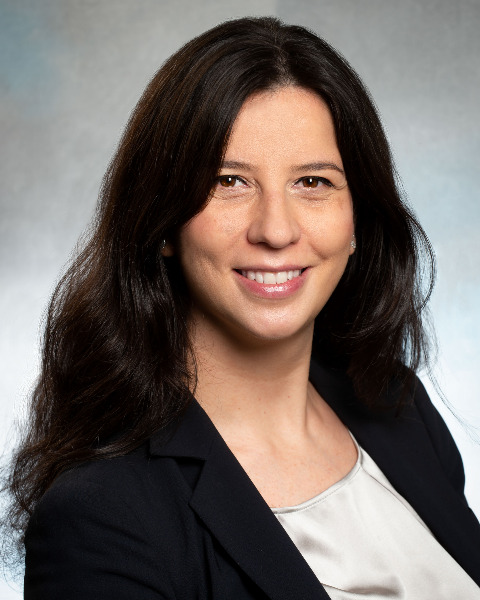Cellular and T cell engager Immunotherapy
Poster Session 1
P-004: Expansion, persistence, and characteristics of autologous, BHV-1100 ARMored memory-like NK cells infused prior to autologous stem cell transplant in MRD+, newly diagnosed multiple myeloma patients
Wednesday, September 27, 2023
1:30 PM - 2:30 PM EEST


Giada Bianchi, MD
Assistant Professor, Associate Director Amyloidosis Program
Brigham and Women's Hospital, Harvard Medical School, Boston, MA
Boston, Massachusetts, United States
Introduction: Autologous stem cell transplant (ASCT) improves MRD negativity and prolongs progression free survival in newly diagnosed multiple myeloma (MM) patients. MM NK cells are dysfunctional, negatively impacting outcomes. BHV-1100, an Antibody Recruiting Molecule (ARM), binds to CD38 target cell antigen and recruits NK cells for ADCC. Allogeneic, cytokine induced memory-like (CIML) NK cells effectively treat myeloid disorders. It is not known if autologous CIML NK cells can be obtained and, when coated with BHV-1100, would improve ASCT outcomes in MM.
Methods: We designed a first-in-human study of autologous CIML NK cells coated ex-vivo with BHV-1100 for MRD+, newly diagnosed MM patients undergoing ASCT. Cells were manufactured in house from non-mobilized lymphapheresis. CIML NK cells were obtained via overnight incubation of enriched NK cells with IL-12 (10ng/ml), IL-15 (100ng/ml), and IL-18 (50ng/ml) and subsequently coated with BHV-1100. The product was infused fresh on D0 after standard melphalan 200 mg/m2 myeloablative conditioning and followed by stem cells infusion. Low dose IL2 (1 mIU/m2) was administered SQ starting on D+1, QOD for 7 doses.
Results: This is an ongoing trial (NCT04634435) with a median follow-up of 191 days. We are herein reporting data on in vivo expansion and functional characterization of ARMored CIML NK for the first 4 patients. CIML NK cells were manufactured with a 100% success rate and infused at a target dose of 5-10x106 cells. Patients received between 3.9-6.0x106/Kg stem cells. Engraftment based on recovery of neutrophil count occurred on D+12-D+14. There was a 3.5-fold expansion of NK cells in the peripheral blood from D+7 (from 11.1% to 41%) to D+28 that persisted until D+60 (25% total PBMC). Most expanded NK cells were CD56dim, CD16high, KIR high and CD57high. CD57 and KIR expression increased over time from D+7 to D+60, whereas NKG2A expression decreased, indicating expansion of mature, activated and cytotoxic NK cells. Regulatory T cells increased by D+7 (3% vs 15% total PBMC ) and returned to baseline after D+14. The functional capacity of the infused product was tested in vitro against MOLP8 MM cell line. The BHV-1100 ARMored cells had a higher killing capacity compared to untreated CIML NK cells and were stable for up to 24 hours (92.6% target cell death vs 91.1% at 0H, 90.8% vs 81% at 4H and 75.3 vs 73.8% at 24H, E:T ratio 2:1). ARMored cells also showed increased IFN𝛾 (53% vs 37.5%) and CD107a (26% vs 14.9%) production compared to untreated CIML NK cells.
Conclusions: Autologous, BHV-1100 ARMored CIML NK cells have enhanced anti-MM activity in vitro and expand and persist in vivo with peak at D+28 after infusion. This represents an innovative approach to boost autologous cancer immunosurveillance in the context of ASCT. Aside from anticipated infusion reactions, no severe/unexpected adverse events were noted; longer follow up is required to assess safety and efficacy.
Methods: We designed a first-in-human study of autologous CIML NK cells coated ex-vivo with BHV-1100 for MRD+, newly diagnosed MM patients undergoing ASCT. Cells were manufactured in house from non-mobilized lymphapheresis. CIML NK cells were obtained via overnight incubation of enriched NK cells with IL-12 (10ng/ml), IL-15 (100ng/ml), and IL-18 (50ng/ml) and subsequently coated with BHV-1100. The product was infused fresh on D0 after standard melphalan 200 mg/m2 myeloablative conditioning and followed by stem cells infusion. Low dose IL2 (1 mIU/m2) was administered SQ starting on D+1, QOD for 7 doses.
Results: This is an ongoing trial (NCT04634435) with a median follow-up of 191 days. We are herein reporting data on in vivo expansion and functional characterization of ARMored CIML NK for the first 4 patients. CIML NK cells were manufactured with a 100% success rate and infused at a target dose of 5-10x106 cells. Patients received between 3.9-6.0x106/Kg stem cells. Engraftment based on recovery of neutrophil count occurred on D+12-D+14. There was a 3.5-fold expansion of NK cells in the peripheral blood from D+7 (from 11.1% to 41%) to D+28 that persisted until D+60 (25% total PBMC). Most expanded NK cells were CD56dim, CD16high, KIR high and CD57high. CD57 and KIR expression increased over time from D+7 to D+60, whereas NKG2A expression decreased, indicating expansion of mature, activated and cytotoxic NK cells. Regulatory T cells increased by D+7 (3% vs 15% total PBMC ) and returned to baseline after D+14. The functional capacity of the infused product was tested in vitro against MOLP8 MM cell line. The BHV-1100 ARMored cells had a higher killing capacity compared to untreated CIML NK cells and were stable for up to 24 hours (92.6% target cell death vs 91.1% at 0H, 90.8% vs 81% at 4H and 75.3 vs 73.8% at 24H, E:T ratio 2:1). ARMored cells also showed increased IFN𝛾 (53% vs 37.5%) and CD107a (26% vs 14.9%) production compared to untreated CIML NK cells.
Conclusions: Autologous, BHV-1100 ARMored CIML NK cells have enhanced anti-MM activity in vitro and expand and persist in vivo with peak at D+28 after infusion. This represents an innovative approach to boost autologous cancer immunosurveillance in the context of ASCT. Aside from anticipated infusion reactions, no severe/unexpected adverse events were noted; longer follow up is required to assess safety and efficacy.
